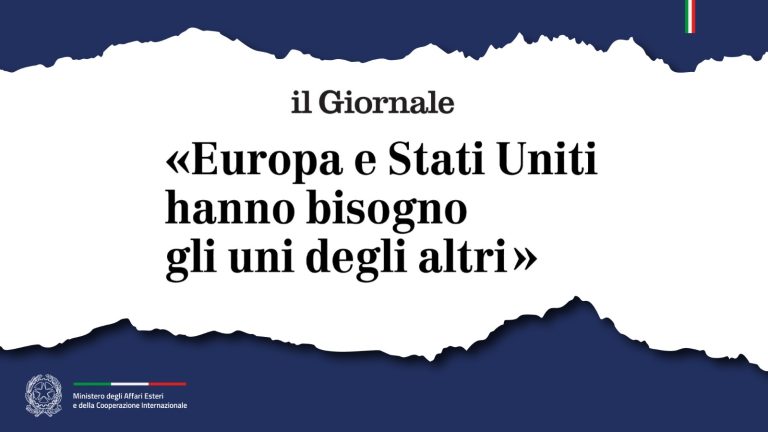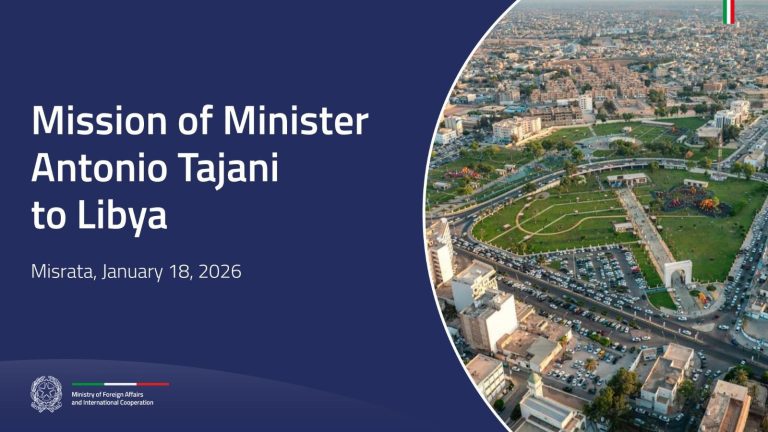The Deputy Prime Minister and Minister of Foreign Affairs replies to our questions in tragic hours for the conflict in the Middle East: “Our compatriots are the Foreign Ministry’s priority”. The leader of Forza Italia, however, does not give up faced with the prospect of an escalation: “A UN presence is needed in Gaza and the West Bank, and we are ready to contribute with Italian soldiers”. As for Netanyahu, “his words at the UN are not ours”. Tajani also goes back to Forza Italia‘s vote in the European Parliament against the use of Western weapons on the Russian territory: “We are consistent; we support Ukraine but we are not at war with Russia”. On the domestic front, no retreat on so-called Ius scholae: “Citizenship is an issue of rights, even before being an issue of laws. And it is compatible with the centre-right’s government programme”. He assures: ‘No veto from Prime Minister Meloni: she does not know our proposal, she will soon have it.” In Forza Italia‘s proposal there is also a tightening on so-called Ius sanguinis. Caution is voiced on Decentralized Autonomy: “It is right to correct all the risks that there could be for the South of Italy’. But Forza Italia’s “no” to the referendums remains.
“We are working on de-escalation. A proposal is ready for so-called Ius scholae.” Tajani: priority to compatriots, we asked Israel to protect our soldiers. We are consistent on Ukraine; we are not at war with Russia.
The Deputy Prime Minister and Minister of Foreign Affairs on the attack in the Lebanon: “Netanyahu’s words are not ours. We need the UN, also with our military, for a united Palestine.” ’We will vote neither for the referendum on citizenship nor for the one on differentiated autonomy. On our side, however, it is consistent to try to correct all the risks that there could be for the South of Italy. We are against Regions‘ headlong rush on exports, which is worth 40 per cent of GDP.” ‘Citizenship is an issue of rights, even before being an issue of laws. And it is compatible with the centre-right’s government programme. No veto from Prime Minister Meloni: she does not know our proposal, she will soon have it. Forza Italia supports Christian values, but we do not flatter anyone”.
For Deputy Prime Minister and Foreign Minister Antonio Tajani, citizenship is first and foremost “an issue of rights, even before being an issue of laws”. This is the reason why his party is determined to soon submit an ‘organic’ bill on the subject, capable of ensuring – to those who want to, and meet the requirements to do so – the “natural right” to become Italian.
Minister Tajani, the referendum on citizenship reached the necessary quorum in a very short lapse of time. Does this not indicate the will of a part of the population to overcome the current law?
First of all, I wish to tell you that I do not agree with the content of the referendum. Forza Italia will not support it, because it is a proposal that is not in tune with ours. It is equally true, however, that there is a need to update the citizenship law.
How do you plan to do this?
We are drafting a proposal for an organic law on the right to citizenship, which will deal with so-called Ius scholae and also with so-called Ius sanguinis.
Can you outline its content?
With specific reference to so-called Ius scholae, we believe that the many children who go to school in Italy, and successfully complete mandatory schooling in Italy, can apply for citizenship. It is a criterion to make them culturally Italian, not only nominally, so that through study they learn and feel truly Italian. This proposal also intends to correct the distortions of the current law, which does not require attendance with successful results, but only enrolment in a school. We aim at more complete integration, because the risk with the current rules is that they gain access to citizenship without being truly integrated. The problem is objective: in Italian schools there are 900,000 students without citizenship for whom we also invest a lot of money. Once we do so, why should they not become Italian citizens?
You also mentioned so-called Ius sanguinis.
It is necessary to intervene. The current law allows people to obtain citizenship by having Italian ancestors without any generational limit. We know, however, that there are those who exploit this possibility to obtain a passport without even the desire to learn our language. And this at a cost of 300 euros. Well, I do not think you can become Italian by buying citizenship in this way. Not to mention scams and the offices clogged up with so many applications. We need a clampdown and more checks. Reverting to so-called Ius scholae, I wish to point out that the centre-right government’s programme committed us to the economic and social integration of legal immigrants. And I would like to reiterate that this has nothing to do with the fight against illegal immigration, which must be pursued decisively.
In this regard, some newspapers claim that Prime Minister Giorgia Meloni has vetoed it. Is this so?
This is not correct. Prime Minister Meloni has simply clarified that she does not know Forza Italia’s proposal and I will be sure to let her know it as soon as possible.
How do you reply to those who accused you of making propaganda and of wanting to flatter the Catholic voters with your openness this summer?
I do not have to flatter anyone. I am a Catholic and I simply say what I think and do politics following my ideals and trying to solve problems according to a Christian, liberal, reformist vision of politics. Forza Italia’s and Berlusconi’s traditional position is in favour of so-called lus scholae. We are not speculating. This is precisely the reason why we have not tabled small amendments to the security government bill or used other ploys. We want an organic reform. We are a Christian party, we have always said so and we are not inventing anything new now.
Let us now focus on differentiated autonomy. You have raised doubts, asking that agreements be made with the Regions only after having identified the basic levels of service (LEP) and their funding. Do you think you will be listened to?
Again in this case, we will not vote in favour of the referendum. I want to make it clear that we are in favour of differentiated autonomy, but it must be implemented properly. As Foreign Minister, I expressed perplexity about my competences, because I had the impression that some of the Regions’ requests went beyond the competences provided for by the Constitution. This is not because I am against autonomy, but because I want it to be done properly. I think it is a way to show consistency on our part. We want to correct all the risks that there could be for the South of Italy. As a party, we have also created an observatory for the implementation of this law. But – for example – when it comes to exports we have to be careful. The sector accounts for 40 per cent of our GDP and we cannot risk competition between Regions with 20 different regional administrations to promote foreign trade that would only bring damage.
Let us come to the Middle East, the death of Nasrallah: how is the situation changing on the Lebanese front?
There is the risk of an escalation, which unfortunately seems ongoing at the moment. We continue to work – today more than ever – for a ceasefire, both in the Lebanon and in Gaza. Furthermore, one of the priorities is the safety of our compatriots. I have personally asked the government of Israel to protect our soldiers in the Lebanon and we have had positive responses in this regard. I am in constant contact with the Embassies in Tel Aviv, Beirut and Tehran. We are following the emergency, ready to evacuate our civilian compatriots. We urge everyone to leave as soon as possible. The situation remains delicate, although we are continuing our diplomatic efforts to achieve de-escalation.
Netanyahu spoke very harsh words against the UN. He called it a “swamp of antisemitic bile”, what do you think about it?
Netanyahu’s words are not our words. Israel has the right to defend itself and this crisis started with the 7 October attack. Later, however, a worrying reaction was triggered, with tens of thousands of victims among the Palestinian civilian population. We did not vote for some UN resolutions because the tone was too unbalanced. We did not recognise Palestine not because we did not want a Palestinian State: but today a united Palestinian State does not exist, there is Gaza and the West Bank, with two different authorities. Our intention is to facilitate the unification of these realities under the leadership of the PNA, possibly with the presence of an Arab-led UN mission for a limited period of time. We are also ready to send our military with the UN for the construction of a Palestinian State that recognises Israel and is recognised by it. Recognising Palestine should not be a “spite” to Israel, but a serious choice to build peace. The Palestinian people have the right to fulfil their dream and Israel has the right to live in peace and security.
The Italian delegations to the European Parliament, with a few exceptions, voted against the use of Western weapons given to Ukraine on Russian territory. But is there no contradiction in this?
There is no contradiction: we help Ukraine in every possible way, politically, financially and by sending food and reconstruction goods. We have adopted nine packages of measures for sending weapons. What they need most are anti-aircraft defences, the well-known Samp-Ts. These are weapons that are needed to defend schools, homes, hospitals. We have said that our weapons cannot be used on Russian territory because we are not at war with Russia. The Americans, too, did so. Moreover, Ukraine has never complained about this to Italy. We have to be careful and understand that we are not at war with Russia. I think this is just common sense: it means working for peace.”



